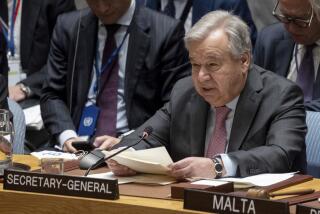U.N. Measure Requires Every Nation to Take Steps Against Terrorism
- Share via
UNITED NATIONS — The U.N. Security Council unanimously approved a U.S.-sponsored resolution Friday night requiring all countries to crack down on terrorism.
In a reversal of Washington’s earlier stance of keeping the U.N. at arm’s length in its new campaign against terrorism, the U.S. enlisted the Security Council’s support in greatly expanding the U.N.’s role in the global fight. U.S. Ambassador John D. Negroponte said the resolution is “unprecedented” in the way it obliges each member nation to cut off funding and political backing for terrorist activities and to share information about terrorist networks.
“There are in our diplomatic lives some days when we have the impression that we make history,” said France’s U.N. ambassador, Jean-David Levitte, the current council president. “Tonight, probably the Security Council made history. Tonight, we have adopted a very ambitious, comprehensive strategy to fight terrorism in all its forms throughout the world.”
The resolution requires all of the U.N.’s 189 member states to treat “willful” financing and funding of terrorism as a criminal offense, to immediately freeze terrorist-related assets and to prevent movement of individuals and groups suspected of terrorist connections.
Every nation must also stop all forms of support to people or groups involved in terrorist acts and deny them “safe haven.” The recruitment of terrorists and supply of weapons to such groups must end, the resolution says, and all countries must accelerate the exchange of operational information, especially about movements and actions of terrorists and their networks.
The resolution stops short of threatening sanctions against those countries that do not abide by the counter-terrorism measures. But the Security Council created a committee to monitor countries’ compliance, and a report on the effort is required every 90 days.
Ambassador Alfonso Valdivieso of Colombia, who holds one of the council’s rotating seats, said, “This is the first Security Council resolution dealing with a conflict that does not name a single country, society or group of people.”
To some U.N. members, that breadth is the resolution’s key weakness. Most of the council members agree that the measures should target Osama bin Laden and members of his network, who are suspected of masterminding the Sept. 11 attacks on the U.S. But without defining what terrorism is, or who the terrorists are, the council is inviting problems, diplomats say. “The intent of the resolution will be read differently by every country,” said Egyptian Ambassador Ahmed Aboul Gheit.
Human rights groups also fear that “terrorism” might be used as an excuse to repress political opponents, the way Nelson Mandela was jailed in South Africa for being a “terrorist.”
The resolution incorporates actions to fight terrorism from a dozen legal instruments approved by the General Assembly since 1963. But only five of them have been ratified, prompting the Security Council to seek a much swifter remedy: a resolution that incorporates Chapter 7, a rarely used mechanism binding countries to act.
Earlier Friday, the Security Council lifted sanctions imposed against Sudan--once host to Bin Laden--for sponsoring terrorism. The action came after Washington withdrew its opposition in an attempt to reward Sudan’s recent cooperation in anti-terrorist investigations, and to build the widest support for the resolution passed later in the day.
The U.S. abstained from the 14-0 vote lifting a travel ban imposed because of Sudan’s alleged role in organizing a 1995 assassination attempt on Egyptian President Hosni Mubarak in Ethiopia.
James Cunningham, the deputy U.S. representative to the U.N., noted that Sudan had not handed over the suspects in the attempt on Mubarak’s life. But, he added, the nation has been helpful since the Sept. 11 attacks, rounding up extremists and reportedly offering the use of its military facilities.
“We welcome those steps and expect this cooperation to continue,” Cunningham said. “We expect the government of Sudan to demonstrate a full commitment to the fight against international terrorism by taking every step to expel terrorists and deny them safe haven.”
Washington will maintain its own broader sanctions on Sudan, imposed in 1996 over Khartoum’s poor human rights record and apparent support for terrorism.
Sudan is one of seven countries on Washington’s list of states harboring terrorists. Bin Laden based his operations there for five years until Sudan expelled him in 1996 in an attempt to end the U.S. sanctions. Other groups linked to Bin Laden are believed to still use Sudan as a haven.
More to Read
Sign up for Essential California
The most important California stories and recommendations in your inbox every morning.
You may occasionally receive promotional content from the Los Angeles Times.












